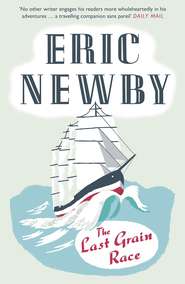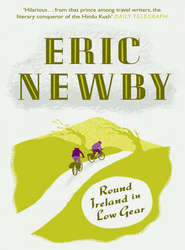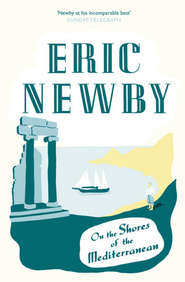По всем вопросам обращайтесь на: info@litportal.ru
(©) 2003-2024.
✖
A Merry Dance Around the World With Eric Newby
Автор
Год написания книги
2019
Настройки чтения
Размер шрифта
Высота строк
Поля
‘Where you bin?’ demanded Tria accusingly, when I managed to join the little knot of survivors who were forcing their way waist deep across the deck, spluttering, cursing, and spitting sea-water as they came.
‘Paddling,’ I said, relieved to find that there were still six of us.
‘Orlright, don’ be all bloody day,’ he added unsympathetically.
‘Tag i gigtåget. One more now. Ooh – ah, oh, bräck dem.’
‘What happened?’ I asked Jansson.
‘That goddam Valker let her come up too mooch,’ said Jansson. ‘I bin all over the bloddy deck in that sea.’
The fore upper topsail was the most difficult. All the buntlines jammed and more than half the robands securing the topsail to the jackstay had gone. The outer buntline block had broken loose and was flailing in the air, so that when we reached the lowered yard eighty feet above the sea, we hesitated a moment before the ‘Horry ops’ of the Mates behind us drove us out on to the footropes, hesitated because the bunt of the sail was beating back over the yard. The wind was immense. It no longer blew in the accepted sense of the word at all; instead it seemed to be tearing apart the very substance of the atmosphere. Nor was the sound of it any longer definable in ordinary terms. It no longer roared, screamed, sobbed, or sang according to the various levels on which it was encountered. The power and noise of this wind was now more vast and all-comprehending, in its way as big as the sky, bigger than the sea itself, making something that the mind balked at, so that it took refuge in blankness.
It was in this negative state of mind that could accept anything without qualm, even the possibility of death, that I fell off the yard backwards. I was the last man out on the weather side and was engaged in casting loose a gasket before we started to work on the sail, when without warning it flicked up, half the foot of a topsail, 40 feet of canvas as hard as corrugated iron, and knocked me clean off the footrope.
There was no interval for reflection, no sudden upsurge of remorse for past sins, nor did my life pass in rapid review before my eyes. Instead there was a delightful jerk and I found myself entangled in the weather rigging some five feet below the yard, and as soon as I could I climbed back to the yard and carried on with my job. I felt no fear at all until much later on.
It needed three-quarters of an hour to make fast the weather side. Time and time again we nearly had the sail to the yard when the wind tore it from our fingers.
My companion aloft was Alvar.
‘What happened?’ he said when we reached the deck.
‘I fell.’
‘I din’ see,’ he said in a disappointed way. ‘I don’ believe.’
‘I’m damned if I’m going to do it again just because you didn’t see it.’
‘I don’ believe.’
‘Orlright,’ I said. ‘The next time I’ll tell you when I’m going to fall off’
‘Dot’s bettair,’ said Alvar.
At noon on Saturday, the 25th, our position was 50° 7’ S, 164° 21’ W. In the 23½ hours from noon on the 24th Moshulu had sailed 241 miles and made 228 between observed positions. Her previous day’s runs were 296 and 282, but the violence of the sea and the necessary reduction in canvas were slowing her increasingly.
The barometer fell and fell, 746, 742, 737 millimetres. The sun went down astern, shedding a pale watery yellow light on the undersides of the deep black clouds hurrying above the ship. It was extremely cold, colder than it had ever been, blowing a strong gale, force 9. Big seas were coming aboard. I felt very lonely. The ship that had seemed huge and powerful was nothing now, a speck in the Great Southern Ocean, two thousand miles eastwards of New Zealand, three thousand from the coast of South America, separated to the North from the nearest inhabited land, the Cook Islands and Tahiti, by two thousand miles of open sea; to the South there was nothing but the Antarctic ice and darkness. She was running before seas that were being generated in the greatest expanse of open ocean, of a power and size unparalleled because there was no impediment to them as they drove eastwards round the world. She was made pygmy too by the wind, the wind that was already indescribable, that Tria said had only now begun to blow.
We rounded Cape Horn on 10 April, Easter Monday, having sailed more than six thousand miles, and were fifty-five days to the Line. We were one day ahead of Parma’s record-breaking passage of eighty-three days from Port Victoria to Falmouth in 1933. That year she had been thirty days to the Horn, twenty-five to the Line, but in 31°N 47°W our luck deserted us and we failed to pick up the strong westerlies we needed to beat her.
On 9 June at 8 p.m., ninety days out from Port Victoria, we raised the Fastnet Rock, fifteen miles to the north-east. We had smelt the land for days. The following morning and until evening we were becalmed near the Rock. Five men rowed out to us from Crookhaven, near Mizen Head, nine miles. The Captain made them drunk on rum and we left them drifting into the sunset in the direction of the New World. (More than twenty-five years later I got drunk in Crookhaven with the survivors of this long row.) Then a breeze came up and took us ghosting along the coast of Southern Ireland, past Cape Clear. Nothing could have been more beautiful to us than this country at this moment.
The following day at 5 a.m., the wind shifted from NW through W to WS W, the best sort of wind and we squared away for Queenstown. At about eleven o’clock we took a pilot from a black and white cutter, heaving-to for him to come across to us in a rowing-boat. Then both watches went to the fore braces, boarded the fore tack and began to clew up the remaining course sails, before racing aloft to see which watch could be the first to furl the Main and Mizzen. We won, in the port watch.
We came to anchorage off the narrow entrance to Queenstown under a couple of topsails and staysails. It was twelve o’clock ship’s time on Saturday, 10 June 1939, and we were ninety-one days out from Port Victoria, having sailed a round voyage of more than thirty thousand miles.
The Pilot told us that we were first home, and although we did not know it at the time, we had won the Last Grain Race.
On the 19th June Moshulu was ordered to Glasgow and a tug was sent to tow us. It seemed an ignoble end to such a venture. On the 21st the tug appeared. ‘Kommer bogserbaten,’ everyone said. The ‘bogserbåt’ took us out into a nasty sea with a head wind in which we only made 5 miles in an hour. Steering behind the tug on a dark night in the Irish Sea was as bad as anything in the West Wind and much more dangerous.
At last on the 27th June we were warped with infinite difficulty into Queen’s Dock, in Glasgow.
‘Coming again?’ asked the Captain some days later, after some good parties, as he inked in my discharge as Ordinary Seaman and handed over some fragments of pay. ‘Make a man of you next time.’
‘I’ll think it over,’ I answered.
My trunk was loaded on to a taxi. Suddenly those of the crew still on board seemed remote and once more strangers.
Now we were turning through the dock gates into the main road where the trams rattled and swayed. I looked back at Moshulu whose masts and yards towered above the sheds in the June sunshine.
I never saw her again.
(#ulink_36e80254-b7c6-5503-bcc1-608671b65622) ‘Backlagsman’ – Mess man.
(#ulink_8c3f6042-a2a8-550c-8544-ad41d16cae77) When running to the east in southerly latitudes a day, noon to noon, is about 23½ hours.
A Short History of the Second World War (#ulink_47ce75ca-96df-51f9-9a5c-41178aedb2e1)
ONE MORNING IN August 1940 ‘A’ Company, Infantry Wing, was on parade outside the Old Buildings at the Royal Military College, Camberley. Company Sergeant-Major Clegg, a foxy looking Grenadier, was addressing us ‘… THESE WILL BE NO WEEK-END LEAF,’ he screamed with satisfaction. (There never had been.) ‘That means no women for Mr Pont, Mr Pont (there were two Mr Ponts – cousins). Take that smile off your face Mr Newby or you’ll be inside. Wiring and Demolition Practice at 1100 hours is cancelled for Number One Platoon. Instead there will be Bridging Practice. Bridging Equipment will be drawn at 1030 hours, CUMPNEE … CUMPNEEEE … SHAAH!’
‘Heaven,’ said the Ponts as we doubled smartly to our rooms to change for P.T. ‘There’s nothing more ghastly than all that wire.’
I, too, was glad that there was to be no Wiring and Demolition. Both took place in a damp, dark wood. Wiring was hell at any rate and Demolition for some mysterious reason was conducted by a civilian. It always seemed to me the last thing a civilian should have a hand in and I was not surprised when, later in the war, he disappeared in a puff of smoke, hoist by one of his own petards.
In June 1940, after six months of happy oblivion as a private soldier, I had been sent to Sandhurst to be converted into an officer.
Pressure of events had forced the Royal Military College to convert itself into an OCTU, an Officer Cadet Training Unit, and the permanent staff still referred meaningfully in the presence of the new intakes to a golden age ‘when the gennulmen cadets were ’ere’.
‘Ere’ we learned to drill in an impressive fashion and our ability to command was strengthened by the Adjutant, magnificent in breeches and riding boots from Maxwell, who had us stationed in pairs on the closely mown lawns that sloped gently to the lake. A quarter of a mile apart, he made us screech at one another, marching and countermarching imaginary battalions by the left, by the right and by the centre until our voices broke under the strain and whirred away into nothingness.
Less well we carried out a drill with enormous military bicycles as complex as the evolutions performed by Lippizanas at the Spanish Riding School. On these treadmills which each weighed between sixty and seventy pounds, we used to wobble off into the surrounding pine plantations, which we shared uneasily with working parties of lunatics from the asylum at Broadmoor, for TEWTs – Tactical Exercises Without Troops.
Whether moving backwards or forwards the TEWT world was a strange, isolated one in which the lunatics who used to wave to us as we laid down imaginary fields of fire against an imaginary enemy might have been equally at home. In it aircraft were rarely mentioned, tanks never. We were members of the Infantry Wing. There was an Armoured Wing for those who were interested in such things as tanks and armoured cars and the authorities had no intention of allowing the two departments to mingle. Gradually we succumbed to the pervasive unreality.
‘I want to bring home to you the meaning of this war,’ said a visiting General. ‘In four months those of you who are not RTU’d – Returned to your Units – will be platoon commanders. In six months’ time most of you will be dead.’
And we believed him. Our numbers were already depleted by a mysterious outbreak of bed-wetting – an RTU-able offence. In a military trance we imagined ourselves waving ashplants, charging machine-gun nests at the head of our men. The Carrara marble pillars, which supported the roof of the chapel in which we carried out our militant devotions, were scarcely sufficient to contain the names of all those other ‘gennulmen’ who, in the earlier war, had died in the mud at Passchendaele and among the wire on the forward slopes of the Hohenzollern Redoubt. They had sat where we were sitting and their names were set out in neat columns on the pillars like debit entries in some terrible ledger.
This dream of Death or Glory affected our leisure. Most of us had passed our formative years in the outer suburbs. Now, to make ourselves more acceptable to our employers we took up beagling (the College had the Eton Beagles for the duration); ordered shirts we couldn’t afford from expensive shirtmakers in Jermyn Street and drank Black Velvet in the Hotel. The snugger pubs were out of bounds for fear we might meet a barmaid who ‘did it’. No one but a maniac would have wanted to do it with the one at the Hotel.
The bridging equipment was housed in a low, sinister-looking shed near the lake on which we were to practise. This was not the ornamental lake in front of the Old Buildings on which, in peace time, playful cadets used to float chamber pots containing lighted candles – a practice now forbidden by the blackout regulations. It was an inferior lake, little more than a pond; from it rose a dank smell of rotting vegetation.
Inside the shed there were a number of small decked-in pontoons and strips of heavy teak grating which were intended to form the footway. Blocks and tackle hung in great swathes from the roof; presumably they were to hold the bridge steady in a swiftly flowing stream. Everything seemed unnecessarily heavy, as though it was part of the gear of a wooden ship-of-the-line.
There was every sign that the bridge had not been used for years – if at all. The custodian, a grumpy old pensioner rooted out of his cottage to open the door, confirmed this.
‘What yer think yer going to do with it, cross the Channel?’ he croaked.











